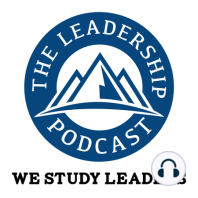39 min listen

TLP032: The Profound Disconnect Between Bosses and Employees
TLP032: The Profound Disconnect Between Bosses and Employees
ratings:
Length:
46 minutes
Released:
Jan 25, 2017
Format:
Podcast episode
Description
Co-hosts Jan Rutherford and Jim Vaselopulos interview Mary Kelly, CEO at Productive Leaders. They speak with Mary about the challenges of leadership in industry, and what happens when a leader tries too hard to be liked. They also discuss how employees perceive leaders differently than leaders perceive themselves. They discuss accountability, fairness, consistency, and mentoring. They end with a discussion on motivation, happiness, and contributors to depression. Listen in to learn more about steps leaders can take today to build trust and accountability in their organization. Key Takeaways [3:23] Productive leadership is hard, with competing demands from above and below. In the military, everyone wants to lead; to be productive. In many cases in business, we take the enjoyment out of being a leader. We’ve made it difficult to be a leader. If leaders make mistakes, they get fired. Some ineffective leaders put themselves first, and lack compassion. [6:34] Simon Sinek did a video on Millennials, whose parents wanted to be liked instead of being respected. Jim says, being respected is hugely important. If you care about people, they will like and respect you. Mary says, they like you, until you make a decision that is not in their best self-interests, and then they don’t like you — but, if you made a fair decision, they will still respect you. [8:38] For Peter Stark and Mary Kelly’s recent book, Why Leaders Fail, they studied over 100K employee surveys from over 10 years, used that data, and crafted a survey for the employee’s bosses. They received 1,000 survey responses. The responses exposed a large disconnect between the bosses’ thoughts and the employees’ perceptions of what was happening. [9:28] The book observes seven common leadership failures: (1) lacking vision and clear goals, (2) sabotaging trust, (3) self-interest, (4) unfairness and inconsistency, (5) not understanding how to build a team, (6) wanting to be liked instead of respected, and (7) turning confidence into arrogance. This last failure stirs the most emotion. [15:55] Hold people accountable for their actions, for what they do, as well as for what they don’t do. Encourage them to take initiative, even if it means risk. The right risks are acceptable. Make sure people are doing their job. Don’t just go to your go-to person and let others skate. Assign jobs consistent with people’s job responsibilities, and then hold them accountable. [20:12] Jan talks about succession planning throughout the organization. People want to know what their path is, and that there is a concerted effort to develop their skills for their future aspirations. Mary sees some who come into an organization for a specific job, want to do it well, and not to be promoted. Leaders will recognize where individuals can do their best work. [24:23] Big companies in many ways have outsourced the risk-taking to startups; and if they’re successful, then they absorb them, destroying the startup culture. Big companies just aren’t good at taking risks. Risk is the path to growth. [26:36] Jan quotes Dan Pink and Frederick Herzberg about motivators. Mary says attracting top talent is critical for every organization. The happy medium between Herzberg and Pink is that people are individuals. Everyone needs different motivators. Most people leave jobs because of their boss or coworker. They knew what the job and salary were when they walked in the door. [31:30] Mary believes in strength-based jobs. Don’t “work on” weaknesses. Develop existing strengths. Student report cards with five A’s, but consistent D’s in Economics, give awesome clarity. It means their strength is not in Economics, but in the A subjects. They should not try to be economists. Employees with a project that they love, and have passion for, lead themselves. [40:16] Mary did a study on happiness vs. the need to feel valued. The age group with the highest suicide rate is people over 85, because they feel as though nobody cares, and they’r
Released:
Jan 25, 2017
Format:
Podcast episode
Titles in the series (100)
TLP002: Tom Morris - True Leadership, A New Philosophy of Excellence: Tom asks us to take a break and think – and know yourself. He views philosophy as a mirror to understand one’s true values and beliefs. Being self-reflective is not to slow you down, but make you better. He also said that sometimes, “Talking is... by The Leadership Podcast